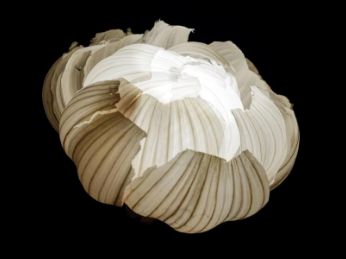In its previous life, the pink piece of cloth that supports the panel made of flip flop fragments served as a garlic net. China is the leading garlic producer during the twentieth and the twenty-first century world-wide.See: Food and Agriculture Organization of the United Nations, Countries by commodity Chinese companies produce large amounts of a type of plastic fabric that looks just like the sample that liina klauss used in her piece.
Made out of Polyethylene (PE) and Polypropylene (PP), such net bags are difficult to reuse as they usually have to be cut open and cannot be closed again. In Taiwan, consumers have recognized this as a problem.China Times, 婆媽被網袋蒜頭綁金屬環打敗 內行人曝一神技完美解套 The Taiwan-based initiative “Bow to Land market”, an organization promoting local farming, is introducing alternative ways of storing garlic to avoid the use of plastic nets, for example by using the traditional method of tying all garlic bulbs together with dried garlic leaves. While garlic braids are sustainable, they can only include a limited number of bulbs.See: Birdsong Farm, How to braid garlic Traditional sustainable predecessors of the plastic nets used nowadays for the transportation and storage of garlic include reusable string bags made of cotton.
There is one other garlic-related object in the UpCycling Hong Kong online exhibition – if you are interested, please click below.

](https://micrio.thingsthattalk.net/sgcsU/views/max/228x128.jpg)
](https://micrio.thingsthattalk.net/egrbH/views/max/128x128.jpg)
](https://micrio.thingsthattalk.net/OKkaw/views/max/181x128.jpg)